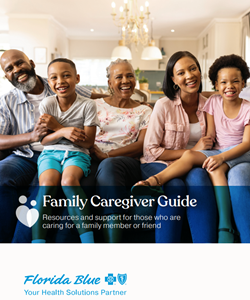
One in five Floridians act as caregivers for someone they love.
Many caregivers take on this extra role in addition to other responsibilities, like working or taking care of children.
We’re here to help you. You can use the resources here to help you on your caregiving journey.
Do you have a caregiving plan?
A caregiving plan can help you and your family manage your loved one’s care and make difficult decisions ahead of time.
Here’s some of the important details your plan should include:
- Information about any health conditions your loved one has
- Their daily routines
- Medications they take, including their pharmacy information and who prescribes their medications
- Your loved one’s doctors
-
Financial and legal resources
o Power of Attorney
o Living Will
o Will and Trust documents
o Funeral/memorial arrangements
o Social Security information
Family Caregiver Guide
If you need help, our Family Caregiver Guide can help you get started. Use this step-by-step guide to help you track your loved one’s conditions, medications, doctors, health, and more.

Legal forms to help manage your loved one’s care
As a caregiver, it's essential to have the right important legal documents in place for your situation to ensure you can make informed decisions and provide the best possible care. Here are some of the documents you may need:
1. Power of Attorney (POA): A document that grants you the authority to make financial, medical, or personal decisions on behalf of the person you're caring for.
2. Advance Directives: Documents that outline the person's wishes for medical care, such as a Living Will, Health Care Surrogate Designation, or Do Not Resuscitate (DNR) order.
3. HIPAA Release Form: A document that allows you to access the person's medical records and communicate with their health care providers.
4. Authorized Representative Form: A document that designates you as the person's authorized representative, allowing you to make medical decisions on their behalf.
5. Guardianship or Conservatorship: Court-appointed documents that grant you the authority to make decisions on behalf of the person, if they are unable to do so themselves.
6. Will or Trust: Documents that outline the person's wishes for the distribution of their assets after their passing.
7. Durable Power of Attorney for Health Care: A document that grants you the authority to make medical decisions on behalf of the person, even if they become incapacitated.
8. Medical Proxy: A document that designates you as the person's medical proxy, allowing you to make medical decisions on their behalf.
It's imporant to note that the specific documents required may vary depending on the state or country you're in, as well as the individual's specific needs and circumstances. It's recommended to talk with an attorney or a qualified professional to ensure you have the necessary documents in place.
Understanding Health Insurance
How well do you know the different types of health insurances? Learn about types of health insurance coverage, from Medicare, to Medicaid, to the Affordable Care Act, to employer coverage.
Medicare Caregiver Resources
Caring for someone who is aged 65 or older means understanding their specific needs. Find the right resources to support them.
Caring for a Florida Blue member? You can register for a Florida Blue caregiver account.
With a caregiver or guardian account, you can log in to your loved one’s Florida Blue member account to view their member ID, plan documents, and more.
- First, you will need a Welcome ID. Please ask the person you are a Guardian or Caregiver for to send you a Welcome ID. They can do this when they are logged into their Florida Blue online member account. The member must add you as a Guardian or Caregiver on their Care Team to trigger an email with the Welcome ID.
- Your Welcome ID arrives in an email after your loved one invites you to be a Guardian or Caregiver.
- Then, fill out your personal details here.